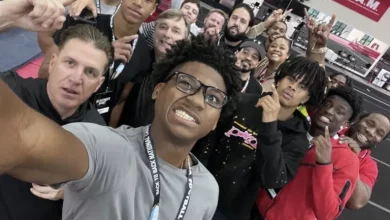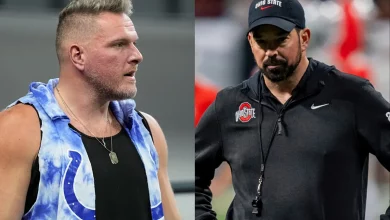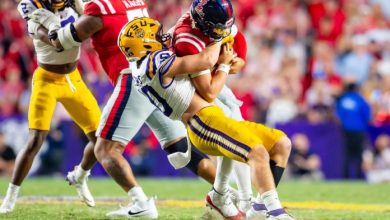Quinn’s toughness and loyalty to UT deserve recognition. Any blame falls on coaching for not addressing his injury. Hook ‘Em!

As the University of Texas Longhorns continue their upward trajectory under head coach Steve Sarkisian, one name that stands out from the past few seasons is that of Quinn Ewers. The highly touted quarterback, who joined the program in 2022, had a tumultuous yet important role in Texas’ efforts to return to national prominence. While the 2023 season provided plenty of promise, it also revealed the immense physical and mental challenges Ewers faced, particularly after an injury sustained in the Michigan game. As fans of Longhorn Nation begin to reflect on his time at Texas and his future at the next level, it’s time for a fair and honest evaluation of the young quarterback’s journey—a journey that demonstrated toughness, loyalty, and a commitment to the program that should never go unrecognized.
The Promise and the Hype: Quinn Ewers Enters Texas
When Quinn Ewers first made his way to Austin, the excitement surrounding his arrival was palpable. A former five-star recruit and one of the most highly rated quarterbacks in recent memory, Ewers was seen as the savior for a program in need of elite quarterback play. His high school performances in Southlake, Texas, had turned heads across the nation, and many pegged him as the future of Texas football.
Sarkisian’s decision to make Ewers the starting quarterback in 2022 was met with optimism and anticipation. The Longhorns needed stability at the most important position on the field, and Ewers, with his raw talent and potential, appeared to be the answer. His arm strength, accuracy, and ability to make all the throws were on full display early in his Texas career, offering fans hope that the program had found its quarterback of the future.
Despite a few early setbacks, including a season-opening loss to Alabama and an injury that sidelined him for part of the 2022 campaign, Ewers showed plenty of promise. His ability to push the ball downfield, read defenses, and deliver clutch passes signaled that Texas was headed in the right direction. The Longhorns were improving, and Ewers was leading the charge.
By the time the 2023 season rolled around, expectations were sky-high. Texas fans, who had longed for a return to the elite level of college football, hoped that Ewers would lead the Longhorns to their first Big 12 Championship in years and perhaps even a College Football Playoff berth. The future was bright, but there were obstacles that would ultimately test Ewers in ways that no one could have anticipated.
The Michigan Game: The Start of Ewers’ Injury Struggles
While 2023 was filled with promise, it would also become a season marked by adversity for Quinn Ewers. It was in the high-profile showdown against Michigan, one of the most anticipated games of the season, that Ewers would suffer an injury that would affect him for the rest of the year.
In what was a hard-fought battle, Ewers took a hit during the game that would prove to be more damaging than initially believed. The injury didn’t immediately take him out of the game, but it set in motion a chain of events that would affect his play for the remainder of the season. Ewers, known for his toughness and determination, continued to battle through the pain, not wanting to let his teammates down or appear weak in front of a passionate fanbase. However, it was clear to anyone watching that something was off. His usual deep ball accuracy, which had been one of his strengths earlier in the season, began to diminish. His throws lacked the zip and precision that had previously defined his game.
Despite the noticeable decline in his performance, Ewers continued to play, attempting to lead the Longhorns to victory and finish what he had started. But this wasn’t just an isolated incident. His struggles continued to surface in the weeks that followed, most notably in the UTSA game. The truth was clear: Ewers wasn’t fully healthy, yet he was doing everything in his power to be there for his team, even if it meant sacrificing his own well-being.
The UTSA Game: Playing Through Pain
By the time the Longhorns faced off against UTSA, the writing was on the wall. Ewers was still feeling the effects of his injury, and it was becoming increasingly difficult for him to perform at the level he was capable of. He was no longer able to make the deep throws with the same accuracy and velocity that had made him such a highly sought-after prospect. Additionally, Ewers, who had previously shown flashes of being able to make plays with his legs when needed, was noticeably reluctant to run the ball. While it was clear that running wasn’t his primary strength, Ewers had made some key plays in the past by using his legs to extend drives and create opportunities for his offense.
However, as he battled through the injury, even his ability to make those limited, opportunistic runs was compromised. The fact that Ewers continued to play through this pain speaks volumes about his toughness and commitment to his team. It would have been easy for him to sit out or at least take a more cautious approach to avoid further injury, but Ewers chose to fight through it for the sake of his teammates and his program.
In hindsight, it’s easy to question whether he should have played through the pain at all, especially when his performance was clearly suffering. But that’s what makes Ewers’ decision to play through the injury all the more remarkable. He was fully aware of the consequences, but his desire to compete for Texas and give everything he had to the program was unwavering.
The Coaching Staff’s Role: The Unseen Responsibility
While Quinn Ewers’ toughness and loyalty to Texas cannot be overstated, it’s also important to consider the role of the coaching staff in this situation. Ewers was clearly not playing at 100% after his injury, and yet the coaching staff continued to put him on the field in games where he wasn’t performing at his best. Some fans, in their frustration with the team’s performance, have pointed fingers at Ewers for his struggles, but it’s equally important to look at the decisions made by the coaches to hide or minimize the extent of Ewers’ injury.
Coaching staff decisions about playing injured players are always a tricky balancing act. On one hand, the program needs to compete and win games, and coaches are understandably reluctant to take their starting quarterback off the field if they think there’s a chance for a successful outcome. But on the other hand, the health and future of the player should always be a priority, and playing someone who is clearly injured can have long-term consequences—not only for the player’s health but also for the team’s overall performance.
In the case of Ewers, it could be argued that the coaching staff should have made a more transparent and careful decision regarding his injury. By continuing to play a clearly hobbled quarterback, the Longhorns risked compromising not just Ewers’ future but the team’s overall potential. It’s a difficult situation for any coach, but one that requires careful thought and consideration for the long-term welfare of both the player and the program.
The Toughness and Loyalty of Quinn Ewers
No matter how the injury was handled by the coaching staff, it’s impossible to deny the incredible toughness and loyalty that Quinn Ewers demonstrated throughout the 2023 season. His decision to play through pain, despite knowing that it was affecting his performance, is a testament to his character. In a sport where toughness is celebrated and expected, Ewers displayed what it truly means to be a leader.
His willingness to fight through adversity also speaks to his commitment to the University of Texas. Ewers didn’t come to Texas just to collect accolades; he came to be part of something greater—to bring Texas back to its rightful place among the elite programs in college football. Despite the challenges, despite the struggles, he remained committed to that mission, doing whatever he could to contribute to the team’s success.
In a world where athletes are often criticized for leaving programs or prioritizing their personal futures over team success, Quinn Ewers’ loyalty to the University of Texas is something that should be appreciated and celebrated. He could have transferred or shut it down to protect his future career, but instead, he chose to fight for his team. That level of commitment is rare in today’s college football landscape.
The Legacy of Quinn Ewers
Looking back on Quinn Ewers’ time at Texas, it’s clear that his legacy will be one of resilience, toughness, and loyalty. Despite the ups and downs, Ewers gave everything he had to the program. His ability to battle through injury, his willingness to play despite his diminished abilities, and his commitment to leading his team all speak volumes about the kind of person and player he is.
For the fans who criticize or blame him for the team’s struggles, it’s important to recognize the bigger picture. Yes, Quinn Ewers had a challenging 2023 season. Yes, his performance wasn’t always at the level that fans hoped for. But the fact that he was out there battling through injury, week in and week out, should be enough for any fan to appreciate what he brought to the table.









